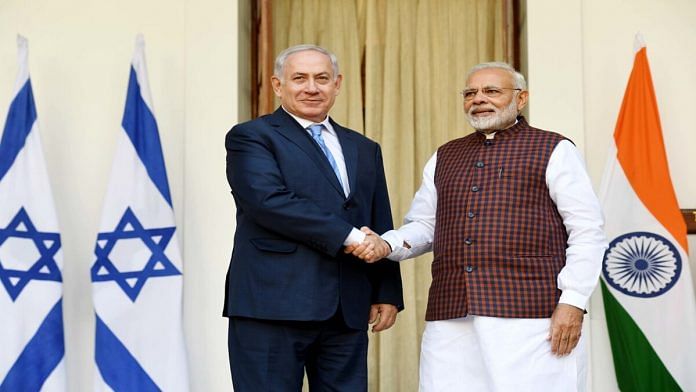More than 72 hours after the terror group Hamas attacked Israel on 7 October, setting off a cycle of violence that has resulted in a rising death toll in the Palestinian territories as well as in Israel, the Ministry of External Affairs has still not issued a statement on the matter.
But Prime Minister Narendra Modi more than made up for the MEA’s absence on the same day by expressing “solidarity with Israel”.
“Deeply shocked by the news of terrorist attacks in Israel. Our thoughts and prayers are with the innocent victims and their families. We stand in solidarity with Israel at this difficult hour,” Modi tweeted. Naturally, the MEA spokesperson retweeted it. A phone conversation with Israeli Prime Minister Benjamin Netanyahu resulted in a second tweet, in which he thanked Netanyahu for giving him an “update” of the situation.
India’s only other reference to the ongoing war in the Middle East, which Israel promises to reshape, is the call to Indians in Palestine to get in touch in case of “emergency” or in need of assistance. For example, how to stay alive when war comes to your doorstep.
The Congress, in sharp contrast, has gone the other way—it has refused to even name Hamas, the terrorist group that crossed the Gaza Strip into Israel over the weekend and fired bullets into a peaceful music festival underway in a southern kibbutz. More than 260 people were killed and several were taken as hostages.
So why is the MEA not exercising its traditional caution in this latest conflict between Israel and Palestine?
The reason is really quite simple. When Modi takes a position, the MEA naturally must take a back seat.
Also read: Israel must internationally annihilate Hamas. Just destroying their military won’t be enough
History of violence
Certainly, Hamas cannot be forgiven for its horrific terror act. The people of Israel have been targeted and the rest of the world stands shoulder to shoulder with them. But let’s also not forget that this latest horror has not taken place in a vacuum. There is an awful history to the violence, and Palestinians have usually been the targets of Israeli aggression. And there are always two sides to a story.
Modi’s expression of solidarity with Israel in this case is the right thing to do. But by declaring its policy on social media, limited to 280 characters, India has picked a side in the ongoing war. And it might impact India’s foreign policy-making in the time to come.
One can always ask why India’s Minister of External Affairs S Jaishankar, one of the smartest people in this government who is backed by some of the brightest diplomats in the world, didn’t reshape the tweet in some way. Perhaps a few words calling for the protection of civilians on both sides, as the UAE has done, would have been a better idea.
An eye for an eye, as MK Gandhi once famously said in response to Old Testament rhetoric, makes the whole world blind.
Even Thomas Friedman — the American journalist who has covered the Middle East like few others, and his travelogue From Beirut to Jerusalem is still a compelling read — has blamed Netanyahu and his defence minister for not just being asleep on the job, but also refusing to talk peace with Israel’s neighbours, the Palestinians.
It seems that the Indian response as articulated by Modi is more in line with US President Joe Biden’s full-throated statement of support, rather than the more measured, middle-of-the-road approach taken by both Russia and China.
Also read: Hamas ‘militants’ or ‘terrorists’? BBC & Canadian public broadcaster face ire over Israel coverage
India-Israel growing ties
The India-Israel relationship has evolved to become one of the deepest and most effective ties in recent decades. India was the last non-Muslim nation to fully recognise the Jewish state in 1992, even though back-channel talks had been going on for a while and an Israeli consulate in Mumbai opened in 1953.
Besides defence, agriculture, and people-to-people ties – cemented by the continuing arrival of thousands of Israelis every year to Indian tourist hotspots such as Manali and Goa and Varanasi and emigration– Israel has offered moral, diplomatic, training as well as equipment support in the worst terrorist crisis that India has suffered.
When the Mumbai attacks happened in 2008, the Israelis were among the first to offer help in any way that India wanted.
Much has already been written about the manner in which the relationship has changed from the time Israel’s former Prime Minister Ariel Sharon came to India under the Atal Bihari Vajpayee government as an honoured guest, to the present moment when Modi and Netanyahu have become soulmates.
The problem with taking sides, of course—as Modi has done in this case with Israel—is that besides shifting your moral compass, it also affects your own civilisational values.
Certainly, India doesn’t want to be ruled out of the game in the Middle East. You want to protect your gains that have ensued with deepening ties with Tel Aviv – like large parts of the Middle East, led by the UAE are doing – but you don’t want to jeopardise the Middle Path by seeming to abandon your old friends.
In the current round, the Israelis are the victims. No room for whataboutery here. But some balance, where India returns to the centre, might be a good idea.
Until then, India’s prayers must be with the victims of this awful, latest bout of violence—the people of Israel.
Jyoti Malhotra is a senior consulting editor at ThePrint. She tweets @jomalhotra. Views are personal.
(Edited by Ratan Priya)



